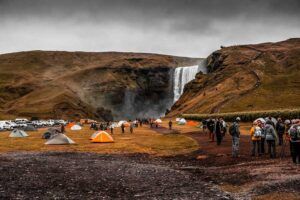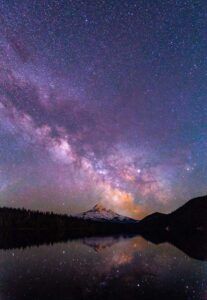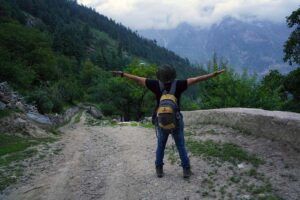We are arguably living in the most stimulating age. The amount of social media, news, and television that we consume on a daily basis is overwhelming. Notifications on our phone tell us the good, the bad, and the ugly of what’s happening in the world. Our obsession with what’s going on in our friends’ lives, and the compulsion to have them know what’s happening in ours, takes a toll on our peace of mind. The ability to unwind after a long day’s work is getting harder and harder because it’s difficult to “unplug.”
The good news is that summer and autumn are a perfect opportunity to do so. Warm weather and vacation time can provide the opportunity to distance ourselves from the madness of the online world. With an intention to find a renewed self, we can immerse ourselves in nature to cultivate a feeling of tranquility.
In thinking about the significance of nature as a source of sustenance, beauty, and peace, I looked to the Qur’an. There are so many ayahs that direct us to nature. The mentioning of certain elements of nature are used to help us identify Allah’s signs. It’s important to understand what those signs are so that we can achieve a deeper awareness of Allah and the enormity of His power, wisdom, and mercy. In taking a closer look at how Allah describes the natural world, we can increase our relationship with Him SWT.

Searching for Allah’s Signs
When we are young, our ability to grasp an understanding of Allah and even our own existence is difficult. For a child, not being able to see or feel something or someone can make it hard to establish a connection. What was helpful for me growing up was being told about Allah’s signs. Sometimes Allah gives us indication of His existence, mercy, and presence by His creation of people, places, and things on Earth. In surah Qaf, Allah says, “And the Earth, We spread it out, and cast therein firmly-set mountains and We have made to grow therein of all beautiful kinds; giving insight and a reminder to every servant who turns [to Allah]” (Qur’an 50:7-8).
These verses describe the beauty that Allah unfolded on the Earth when He created mountains where trees and plants of all kinds grow. According to PRB, a demography and global health organization, “10 percent of [the] world population, live in mountain areas.” In addition, 37% of the humans living today “rely on mountains to provide fresh water to drink, grow food, generate hydropower, and sustain industries.” The mountains, like all natural phenomena are visual reminders of Allah’s existence and provisions to those He has created. If you travel to any major mountain range in the U.S like the Appalachians, Rocky, or the Sierra Nevada you will be amazed by the enormity of the rocks. It will make you contemplate your existence and inspire you to think about Allah’s might and ability to create massive, beautiful natural aspects with just a word, “’Be,’ and it is” (Qur’an 36:82).
Further, Allah illustrates the power of His revelations by noting that even the mountains, however enormous, would feel the impact of Allah’s majesty: “Had We sent down this Qur’an upon a mountain, you would have certainly seen it humbled and torn apart in awe of Allah. We set forth such comparisons for people, so perhaps they may reflect” (Qur’an 59: 21). We are told here to reflect upon the fact that even the mountains, so firmly-set, so colossal, would be humbled and broken asunder due to awe of Allah.
Another one of the major signs from Allah is the existence of night and day. Allah explicitly tells us in Surah Ali Imran, The Family of Imran, “And to Allah belongs the dominion of the heaven and earth, and Allah is over all things. Indeed, in the creation of the heavens and the earth, and the alternation of the night and the day are signs for those of understanding” (Qur’an 3:189-190). He SWT explicitly says that we should look to the night and day as a sign, as a reminder of Allah’s power and sovereignty, His mastery over the world.
I remember years ago, during a trip to Morocco, I had the opportunity to camp in the Sahara Desert. I was captivated by the sunrises and sunsets, as both the sun and the moon rise and set upon the stillness of the sand dunes. Their presence and impact on the desert had such an uplifting effect on my heart and mind. The views from the top of the dune of the blazing sun falling over the horizon were incredible. I just couldn’t believe so much beauty existed.

The captivating experience of gazing at the planets and stars reminds me of the story of Prophet Ibrahim. He too used the existence of the sun and moon to ponder upon his Creator. Part of his story is set out in Surah Al-An’am, The Cattle: “When the night grew dark upon him, he saw a star and said, ‘This is my Lord!’ But when it set, he said, ‘I do not love things that set.’ Then when he saw the moon rising, he said, ‘This one is my Lord!’ But when it disappeared, he said, ‘If my Lord does not guide me, I will certainly be one of the misguided people.’ Then when he saw the sun shining, he said, ‘This must be my Lord— it is the greatest!’ But again, when it set, he declared, ‘O my people! I am free from whatever you associate [with Allah]. I have turned my face towards the One who has originated the heavens and the earth; I am an upright one, not one of the polytheists’” (Qur’an 6:76-79).
In these verses we see that Prophet Ibrahim contemplated the stars, the sun and the moon and came to the conviction that the true Lord of the Worlds is one who is constant and does not disappear. He understood that even though those natural elements were impressive, they clearly were just manifestations of Allah’s creation, and that only He SWT was the originating and presiding divinity. Just as Prophet Ibrahim took the time to ponder upon nature, to think about His creator, we must do so as well.
We can also turn to the growth of fruits and vegetables when seeking signs of Allah’s love, generosity, and magnitude. In Surah An-Nahl, The Bees, Allah says, “He is the One Who sends down rain from the sky, from which you drink and by which plants grow for your cattle to graze. He causes to grow for you thereby the crops, and the olives, and the palm trees, and the grapes, and of every kind of fruit; most surely there is a sign in this for a people who reflect” (Qur’an 16:10-11). Here, we are directly told that the abundance in nature are signs for us to reflect on, not just on Allah’s existence, but generally on the creation of all things and the sustenance we have been provided. The diversity of fruits and vegetables, of trees and plants, really fills me with wonder and awe at the bounty of Allah’s gifts to His servants.

How to Enter Upon the Signs for Yourself
While we still have the last few weeks of summer left, as well as the coming of autumn, take advantage of the opportunity to return to nature. You don’t have to do a cross country trip or hike the Rocky Mountains. You can take a walk to your local park or go to a lake or ocean side, where there aren’t too many people, to find the peace needed to focus on Allah’s signs. If you’re in California, maybe try visiting Lake Tahoe. If you’re on the East Coast, plan a road trip to Niagara Falls. If you’re not able to do a big trip now, then simply go to a park early in the morning where there are lots of trees and you can hear the birds chirping and see squirrels build nests and gather nuts and seeds. Take time to notice the little things. And of course, silence your phone so you aren’t distracted by the online world. In doing so, you will be able to reflect better on your time and purpose in this world, and how you intend to continue cultivating a closeness to Allah SWT.





